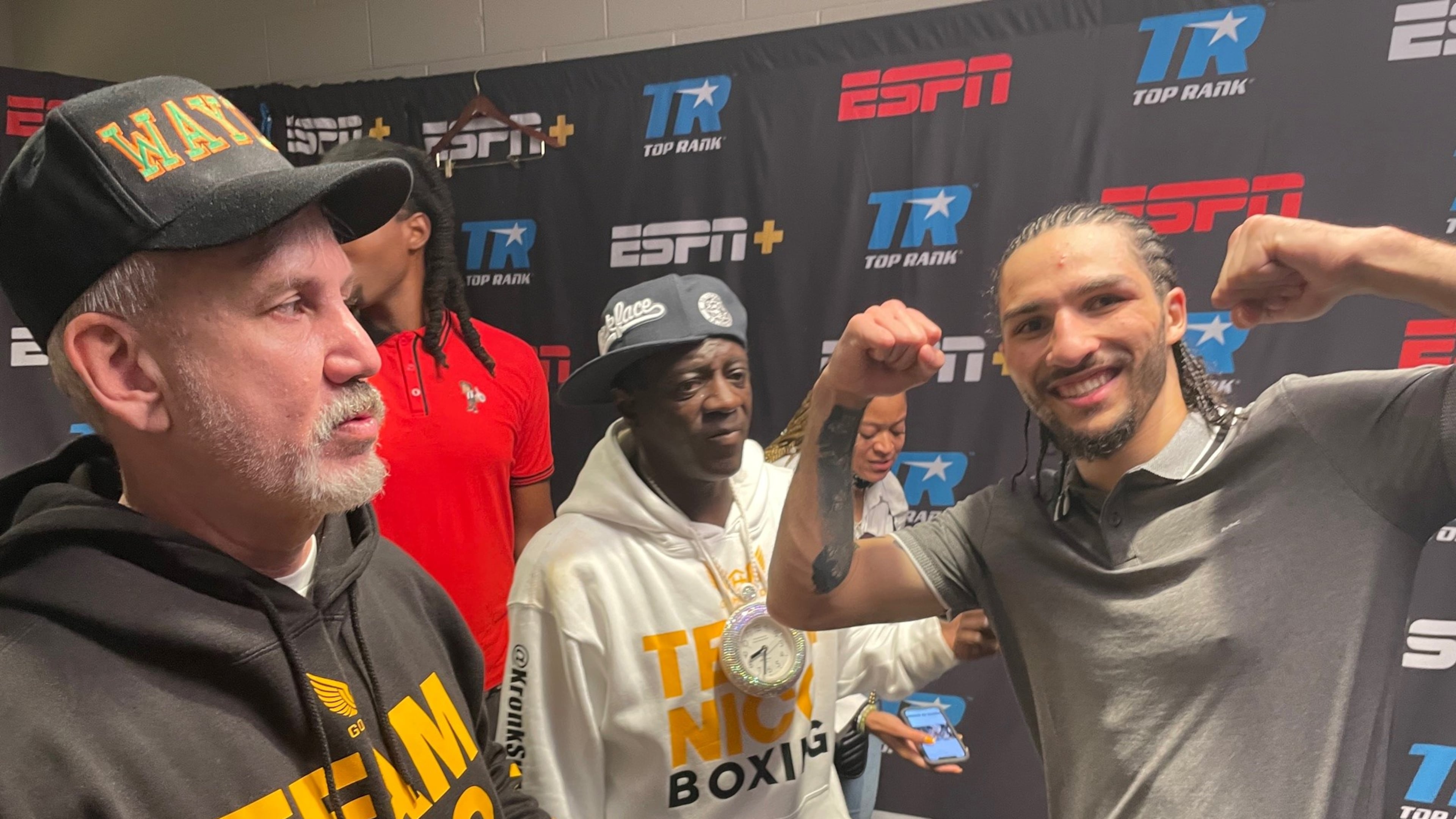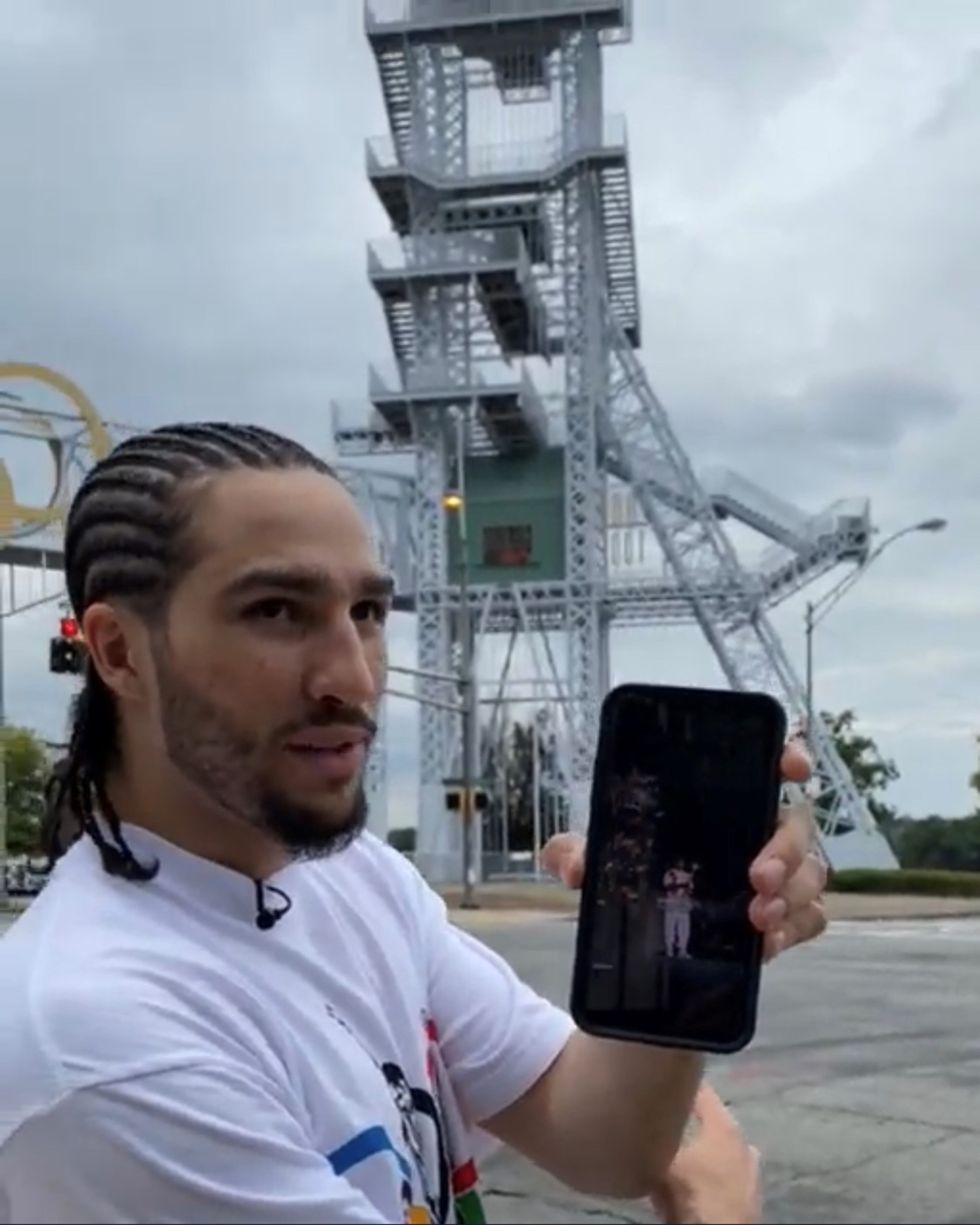OPINION: For grandson of ‘The Greatest,’ not all pressure is in the ring

Upon entering the locker room, I was greeted by an unlikely trio: an Irish boxing trainer from my old Chicago neighborhood, Muhammad Ali’s grandson decompressing after a knockout win and the rapper Flavor Flav, with the ever-present clock dangling across his chest. But a scene like this is not necessarily odd because, well, it’s boxing. And boxing draws together all sorts of personalities and acquaintances.
But these were not mere acquaintances gathered here last Saturday night in the bowels of State Farm Arena in Atlanta. They were a family gathered together partaking in a very rough generational business.
Nico Ali Walsh came to Atlanta to fight his second professional bout, a place where his grandfather experienced two of his most important moments: returning to the ring in 1970 after a three-year exodus from the sport after refusing to be drafted and the magical lighting of the torch to kick off the 1996 Olympics.
Before the fight, Walsh visited the now-relocated Olympic torch tower and gazed upon the forlorn monument while peeking at his iPhone to view a photo of his grandfather, flame in trembling hand. That moment occurred four years before Nico Walsh was even born, so it is a slice of long-ago history for him. Still, it was emotional.
“Atlanta is a very historic place,” he said, “not just for my grandfather but for the whole (civil rights) movement.”
After I walked into the locker room, Mike Joyce, his trainer, who is also a lawyer, brought me to meet his young fighter. He didn’t first introduce me as a reporter or as “a guy I know from the South Side.” Instead, it was, “Hey, this guy got 11 stitches over his eye in his first fight.”
It was instant ring cred but I think he was trying to instill upon his young charge that boxing is an awful rough endeavor. In Saturday’s fight, Walsh, a middleweight, ate a couple right hands but later said they didn’t faze him. He ended the fight with his own straight right in the second round, causing the other fellow’s corner to wave the towel.

No one has to tell Nico Ali Walsh how brutal it gets. He grew up listening to his grandfather whisper to him and watching his unsteady gait. Muhammad Ali’s well-known saga is both a rousing heroic story and devastating tragedy. But here Nico is, trying to carve out his own path. A young man’s gotta do what a young man’s gotta do.
Granted, several people close to him were not overjoyed by the decision this year to turn pro. “I was against it, this is a rough freaking game,” said Joyce, who is not only Nico’s trainer and boxing mentor but he’s also Uncle Mike. Joyce married Jamillah Ali, who is the twin sister of Nico’s mother, Rasheda. Muhammad Ali had eight daughters and a son.
(Full disclosure: Jamillah is a neighbor and friend of my sister, Ann, in Chicago. And I know firsthand that the Ali family can be thoughtful. Upon hearing that my mother-in-law was diagnosed with Parkinson’s disease, Maryum, the oldest Ali sister, called her out of the blue with a cheerful pep talk and advice.)
Walsh, who grew up in Las Vegas, started boxing as a preteen in Chicago charity tournaments under his uncle’s tutelage. In his first bout, at age 11, he tried doing the Ali shuffle and lost a shoe. Later, as a young teen, he was brought to a Las Vegas boxing gym by his godfather, William Jonathan Drayton Jr., who is also known as Flavor Flav, a neighbor of the Ali Walshes.
After perhaps 30 amateur fights (which is not a lot), Walsh decided to try pro boxing, a sordid, ruthless and perilous world. At first, Walsh was thinking of going to Mexico to get some fights. “You know, the Tijuana cabdriver route,” Joyce said. “You go there and build up your record.”
But Joyce knows Hall of Fame boxing promoter Bob Arum, who also promoted a couple dozen Ali fights back in the day, and asked the 89-year-old for his services. “We figured we’d do it right,” Joyce said. They also brought in SugarHill Steward, the head trainer of heavyweight champ Tyson Fury, to teach Walsh a thing or two. He is, as they say, a work in progress.

The first question Nico Walsh gets in any interview is about the pressure of carrying the family name of “The Greatest.” Ken Burns’ newly released documentary on Ali has unleashed the ghosts of the past and fanned the flames of the late champ’s fame.
“I had a lot of pressure on me as a kid. Anyone who fought me tried 10 times harder than they usually did,” he said. Beating Muhammad Ali’s grandson, even the pint-sized version, would be a yarn any fighter would spin forever.
Almost all boxers start their pro career with beatable opponents. Up-and-comers don’t get 15-0 or 20-0 records by fighting world beaters right off the bat. It’s a steady advance where the manager must pick the right opponent who will afford you a learning experience but not loosen your mandible. But to appear on TV, which Walsh has during his first two fights, means he can’t fight boxers with losing records. (Therefore, his opponents were 4-1 and 1-0.)
“I can’t fight tomato cans,” Walsh told me, referring to the sport’s name for pugilistic cannon fodder. Instead, he gets cans of Dinty Moore beef stew.
His uncle would prefer some semi-anonymous fights where his learning curve would not be so public and broadcast on TV. Maybe a few bouts in gymnasiums in Iowa or something.
Walsh’s mother, Rasheda, who spoke to me recently, initially hoped boxing would be a phase and then her son would move onto something else. But his older brother, Biaggio Ali Walsh, was a standout running back, so violent sports were not unknown.
“It was rough for us to watch; I worried,” she said. She still does. “I receive criticism from some parents, ‘How can she let him fight?’ "
But he’s a grown-up, making his own decisions. The family visited a neurologist and got concussion baseline tests to see if there is any change down the road.
“Of course, my dad overstayed his welcome in boxing. He stayed longer than he should,” his mother said. “We know Nico won’t make that mistake. Nico has other plans for his life. You get what you can and you move on.”
Her son is a college student majoring in business.

She said the visit to Atlanta, especially seeing the torch tower, was poignant. That long-ago moment was the first time the public glimpsed the progression of Ali’s Parkinson’s. It brought waves of alternating sadness, sympathy and love.
“He had a lot of emotional anxiety about the disease; he disappeared for a lot of years from the limelight,” Rasheda said. The outpouring after lighting the torch was almost liberating. “He felt he was finally appreciated for what he did.”
Nico says that he’s committed to boxing, “but you have to have a backup plan and a backup plan to your backup plan.”
“I’m just seeing where boxing takes me, where my coach takes me. I’m here for the ride.”
His next fight? It’s scheduled to be in December at Madison Square Garden in New York, which for a long time was considered the mecca of boxing.
So much for the baby steps in Iowa.



